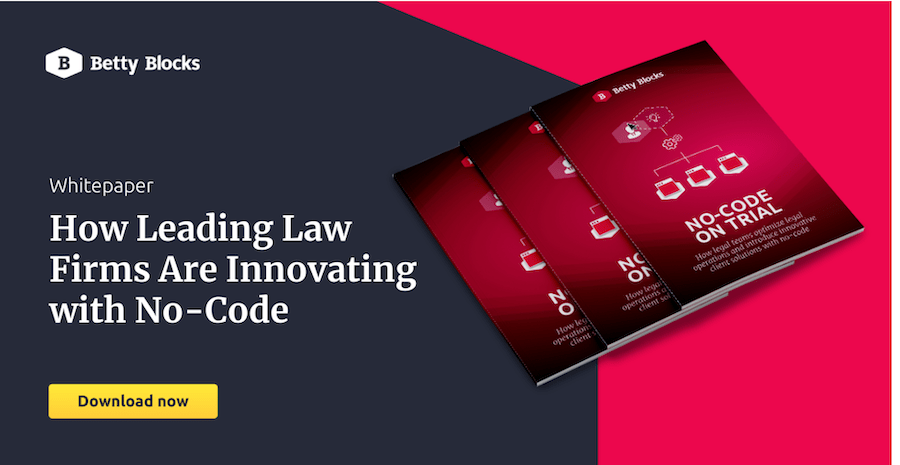
By Chris Obdam, Founder & CEO, Betty Blocks.
The legal industry faces various universal challenges; an ever-changing market, clients with high expectations and endless options, and an impending global recession.
To be successful in this modern and complex world, the legal industry needs modern and complex tooling. Thus, globally, law firms and in-house legal departments are looking for legal tech solutions that enable them to stay agile, robust, and competitive.
Rather than purchasing off-the-shelf or outsourcing development, industry leaders are increasingly taking matters into their own hands. Those at the head of the industry are self-building legal tech solutions. But why are firms doing this, and how does it offer a competitive advantage? Let’s take a look.
Five universal challenges experienced by the legal industry
- Repetitive, non-billable tasks are slowing down business operations and frustrating the workforce
At the core of legal services are huge amounts of documentation and repapering, communication and email threads, drafting and reviewing. Thus, legal professionals spend huge amounts of time on non-billable, manual, repetitive, and error-prone tasks that slow down business operations and are hugely frustrating to a workforce.
- Going to market with new and differentiating internal and client services takes too long
Firms and departments must be able to respond quickly to changing needs for and new types of legal services and support. When a lawyer or a client requires something they need it immediately, not in six months. Having the right digital tools to do this is crucial, and launching them quickly is essential. However, IT departments are stretched for resources, and facing ever-growing backlogs of business needs and requests. Meanwhile, traditional development processes mean slow delivery cycles that work towards fully finished applications which miss the window of opportunity.
- The existing tech stack is limited and lacks the right functionality
Contemporarily, a firm is only as flexible, agile, and capable as its tech stack. However, firms regularly settle for off-the-shelf solutions which do not map onto exact needs, are limited, or lack the right functionality. Thus, as soon as requirements shift or needs adjust, these tools are rendered obsolete and have to be rebuilt or repurchased. This means either spending the same budget and resources twice, or continuing using a subpar tool that slows down business operations.
- Attracting and retaining talent is extremely difficult
It is no secret that fee-earner burnout is on the rise as attorneys are constantly expected to work harder with less resources.
Meanwhile, firms are facing a new generation of young, innovative, tech-savvy lawyers who have lots of expectations and even more choices. These applicants care about the working environment, opportunities, and extra benefits at a company. The modern lawyer wants to work in a modern environment, supported and empowered by the right technologies and innovative structures.
Firms’ outdated and inefficient work processes are thus not only slowing down the business, but making talent turn to the competition or more innovative industries.
- Elevating and improving the client experience
The legal industry faces clients that have extremely high expectations, changing needs, and a wealth of choices. There is always someone trying to offer your clients the same services at faster rates for less money. Firms thus face the huge challenge of elevating and improving the client experience to attract new and retain existing customers.
Solving your own problems: independently building applications
Increasingly, law firms and in-house departments are democratizing digital development: allowing anyone to participate in building legal tech solutions. They do this by leveraging a low-code / no-code (LCNC) platform – an IT sanctioned and governed platform that enables users with no coding capabilities to build digital tools.
By empowering the business to independently build applications, those with the most accurate market insight and knowledge are building the most needed solutions. These look like internal tools which automate and digitize workflows, and client-facing applications that elevate customer services. This alleviates the pressure on IT departments as the business can independently conceptualize, build, and launch their own applications. Meanwhile, this is done in a fully IT governed and secured environment, where IT departments can pre-configure user capabilities, rights, and functionality. As LCNC platforms are built for speed and agility, firms are enabled to go-to-market quickly with future-proof and scalable digital solutions that answer exact needs.
Five key benefits to independently building solutions
- Automate and digitize internal processes to optimize business operations
Repetitive workflows and manual tasks are huge opportunities for digitizing. By self-building tools that automate and digitize these internal processes, the business optimizes and upgrades their own operations. Building bespoke digital tools means that a firm’s solutions map onto their exact needs and requirements. With tools that take over core responsibilities such as project management or planning, generating contracts, reviewing documents, running assessments, or prepping for audits, lawyers can focus on high-complexity tasks requiring human expertise.
- Capitalize faster on market opportunities by rapidly launching innovative solutions
Providing the business with all the tools and processes to independently solve their and their client’s problems means that firms can instantly respond to changing needs or market shifts, and start the building process immediately. Meanwhile, LCNC platforms are built for rapid application development, where users can build prototypes in days and launch fully functional applications in weeks.
- Scale business capabilities with a no-code foundation
Self-building solutions with a LCNC platform enables firms to build an innovation layer around their existing tech stack or legacy system by integrating applications. With a platform like Betty Blocks, low-code capabilities mean that more experienced coders can add functionality and complex elements. These added components can be turned into no-code building blocks to be used by business developers. Pro-coders and business developers can thus work together to always add functionality and capabilities to their no-code foundation. This means building at accelerating rates, and creating a tech stack that is scalable and future-proof.
- Increase employee happiness and attract talent with a modern way of working
By providing the business with the tools and capabilities to build their own tools, an organization creates an empowering and innovative culture. This means that lawyers can independently conceptualize and create the solutions to their own problems without requiring any further help. As a result, lawyers have higher quality tooling available, and can solve their issues consistently with the right legal tech. Thus a modern way of working increases employee happiness and attracts new talent.
- Elevate client experience and satisfaction with fully differentiating legal tech solutions
Using LCNC tooling, firms can build competitive and differentiating customer-facing solutions which optimize and elevate the client experience. Thus, a firm combines its technological capabilities with its expertise to offer the best, fastest, and most accessible services. Self-building means that those who know exactly what their clients want and need are building these tools. Through solutions such as self-service portals, request applications, or knowledge bases, clients can independently access a firm’s expertise 24/7 from anywhere in the world without having to involve a legal professional.
The future is self-building
Increasingly, industry leaders are choosing to self-build applications as a tactic to stay agile, robust, and competitive – now and in the future.
It is no coincidence that this is one of the key topics at this week’s Legal Innovators London. There, on Thursday 10th November at 13:55, Betty Block’s own Legal Innovator Paddy O’Shaughnessy is chairing a panel discussion with industry leaders on the ‘Increasing trend for law firms to build their own tools for client use’. Check out what else Betty Blocks has in store for Legal Innovators attendees.
Already know you’re going? Set up a meeting with the Betty Blocks team ahead of time to make sure you catch us while we’re in London. We can’t wait to see you!
Curious about what your law firm or department should look for in a LCNC platform, or what types of applications industry leaders are self-building? Check out our legal whitepaper:

—
About the Author

Chris Obdam is founder and CEO of no-code platform Betty Blocks. He’s a born programmer turned internet entrepreneur with a passion for people and a lust for life. His vision is to empower the human side of innovation and push the limits of what is possible with technology.
—
[ Artificial Lawyer is proud to bring you this sponsored thought leadership article by Betty Blocks. ]